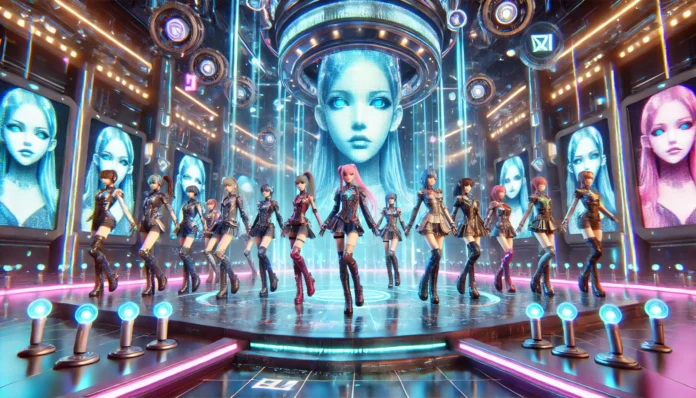K-Pop is known for pushing creative and technological boundaries, and the latest innovation in the industry is AI-powered K-Pop groups. These digital idols, designed using artificial intelligence, deep learning, and CGI, are redefining entertainment by offering hyper-realistic performances, interactive experiences, and limitless creative possibilities. AI idols are gaining popularity among fans, raising both excitement and concerns about the future of music.
What Are AI K-Pop Groups?
AI K-Pop groups are virtual bands composed of digital idols that do not physically exist but are designed to sing, dance, and interact with fans just like human artists. Some of these idols are completely AI-generated, while others are hybrid models, where real people provide voices and motion capture for animated figures.
Notable AI K-Pop Groups and Idols
1. MAVE: (메이브) – The Hyper-Realistic Virtual Girl Group
Created by Metaverse Entertainment and Kakao Entertainment, MAVE: debuted in 2023 as a fully AI-generated K-Pop girl group with four members: Siu, Zena, Tyra, and Marty.
- AI Technology: MAVE: is created using a combination of deep learning, motion capture, and hyper-realistic CGI, making them look incredibly lifelike.
- Music and Performances: Their debut song “Pandora” gained international attention for its high-quality visuals and AI-powered choreography.
- Fan Engagement: The members communicate with fans through social media posts and interviews, simulating real interactions.
2. PLAVE (플레이브) – The AI Boy Group with Real Voices
PLAVE is a five-member AI boy group under Vlast that debuted in 2023. Unlike fully AI-generated idols, PLAVE has real human voices behind their animated personas. The members—Yejun, Noah, Bamby, Eunho, and Hamin—are virtual but perform with the energy of real K-Pop stars.
- Unique Feature: PLAVE’s members are designed like anime characters, combining gaming aesthetics with K-Pop performance culture.
- Live Streaming and Interactions: They frequently live stream, respond to fan comments, and even play games, creating a more personal bond with fans.
- Chart Performance: Their songs have charted on Korean music platforms, proving that AI groups can compete in the mainstream K-Pop industry.
3. Eternity (이터니티) – The First Fully AI-Generated Girl Group
Unlike PLAVE, which uses real voices, Eternity is a K-Pop group made entirely of AI-generated vocals and visuals. Created by Pulse9, Eternity consists of 11 members who were designed using AI technology.
- AI Capabilities: Each member’s appearance, dance moves, and voice are generated using deep learning algorithms.
- Scandal-Free Idols: Since AI idols do not have personal lives, they never face real-world controversies, making them appealing to agencies.
- Challenges: Despite their futuristic appeal, Eternity struggles to gain the same emotional connection with fans as real idols.
4. Aespa (에스파) – The Hybrid Human + AI K-Pop Group
Aespa, a girl group under SM Entertainment, debuted in 2020 with a groundbreaking AI concept. The four real-life members—Karina, Winter, Giselle, and Ningning—each have AI avatars called “æ” counterparts, who exist in the metaverse.
- Metaverse Concept: Aespa’s storyline involves virtual worlds, digital beings, and a sci-fi-inspired narrative, blurring the lines between reality and fiction.
- AI Interaction: The AI avatars appear in music videos, social media posts, and even interact with the real members in some promotional content.
5. APOKI – The Virtual Bunny Idol
APOKI is a virtual soloist resembling an anthropomorphic futuristic bunny. While a real person provides her voice, her AI-generated persona has made her one of the first widely recognized virtual K-Pop stars.
- Performance Technology: APOKI uses motion capture and AI-driven choreography, allowing her to deliver flawless stage performances.
- Brand Collaborations: She has worked with major companies, proving that virtual influencers can have real-world impact.
Why AI K-Pop Groups Are Gaining Popularity
1. Cost Efficiency for Entertainment Companies
- AI idols do not require training, salaries, or physical maintenance.
- They can perform in multiple locations at once through holograms or virtual concerts.
2. Expansion of the K-Pop Fandom
- AI idols can communicate with fans 24/7 using chatbots and interactive AI-generated social media content.
- The metaverse allows virtual concerts that fans can attend from anywhere in the world.
3. Limitless Creativity in Performance and Aesthetics
- AI idols can instantly change their appearance, creating new concepts and visual styles without physical limitations.
- They can perform flawless choreography that human artists might find difficult.
Challenges and Ethical Concerns of AI K-Pop
1. Lack of Human Emotion and Authenticity
- Fans love K-Pop idols not just for their performances but for their personalities, struggles, and growth.
- AI idols do not have real emotions, which limits deep fan connections.
2. Job Displacement for Human Artists
- AI idols might reduce job opportunities for trainees, musicians, and background dancers.
- If AI music becomes dominant, human artists may struggle to compete.
3. Legal and Copyright Issues
- Who owns AI-generated content? If an AI idol produces a hit song, does the programmer or the AI itself get credit?
- Some AI idols resemble real people, raising concerns about deepfake ethics and identity theft.
The Future of AI in K-Pop
As technology evolves, AI and human artists will likely coexist. AI idols will not replace human K-Pop groups entirely, but they will introduce new storytelling formats, digital fan experiences, and virtual concerts.
We can expect future AI idols to have:
Real-time audience interactions through AI chatbots.
Self-learning capabilities that improve performances based on fan feedback.
Hybrid collaborations where real idols and AI characters share the stage.
The question remains: Will fans ever accept AI idols as true K-Pop stars, or will they always be seen as digital novelties?
Either way, AI in K-Pop is here to stay, pushing the boundaries of music, technology, and entertainment.





